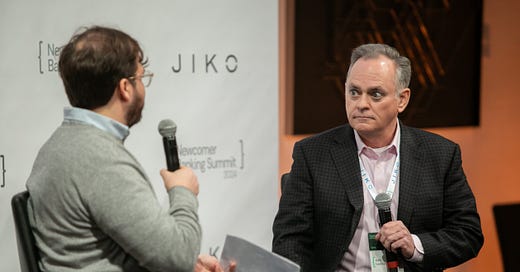Newcomer Banking Summit: All Eyes on Silicon Valley Bank
SVB President Marc Cadieux parried his colleagues-turned-rivals
We’re fresh off yesterday’s Newcomer Banking Summit.
Former SVB and First Republic bankers, now under new colors, circled Silicon Valley Bank like vultures watching their ailing prey, eager to get a piece of the business of serving startups and their funders.
Bankers from J.P. Morgan, HSBC, Stifel, and Citizens made the case for why they should inherit the business of SVB and its failed cohort, First Republic Bank. Similarly, financial technology upstarts like Mercury and Rho were working to lure SVB’s customers away with simple-to-use banking products.
Marc Cadieux, Silicon Valley Bank president, pushed back hard, insisting that Silicon Valley Bank is alive and well — just under the new ownership of First Citizens.
“We never left,” he said on stage, expressing frustration with the “false narrative” about the bank’s demise and noting that 81% of the old bank’s clients had stuck around. “We’re doing all the same things, the same dollar amounts, across the same sectors,” he said, pointing to three billion in new loans during the last nine months of 2023.
After my conversation with Cadieux, investors Laurence Tosi and Peter Hébert took the stage and told the unvarnished tale of SVB’s sudden demise.
“It was like the banking equivalent of the U.S. withdrawal from Afghanistan,” Hébert said. “It was absolute sheer terror.”
For many of the bankers present, the summit ended up being like a public therapy session. (A couple of them told me as much.) They relived the trauma of the failures of Silicon Valley Bank and First Republic on stage.
We’ll begin publishing videos from the Summit next week.
Here Are Some of My Big Takeaways:
There’s an unsustainable amount of competition for Silicon Valley’s commercial banking business right now. Nobody believes all these banks are still going to be vying for SVB’s business in five years. The new competitors saw an opportunity with the meltdowns at SVB and First Republic, but SVB is doing much better than anyone would have expected a year ago. There’s a very real possibility that SVB does hold onto much of its business and bankers regret jumping ship from SVB just because of a little bank failure.
The next few years are going to be a referendum on relationship banking. People like Mercury CEO Immad Akhund are actively trying to kill it. Startup founders think software — not the high-touch relationships that bankers like Citizens Private Bank’s Sam Heshmati and Roberto Rivera envision — are going to win the day. And it’s not just software that could kill relationship banking in Silicon Valley: the sheer amount of competition will surely incentivize venture capital firms and startups to do a better job of shopping around to get the best terms. With so many choices, you’d be a sucker just to take whatever your longtime banker is selling you. Finally, Bain Capital Ventures’ Matt Harris made the big-picture case that artificial intelligence is going to make it much easier for customers — big and small — to constantly reassess whether they’re getting the best price for financial products. The confluence of factors can leave bankers sounding a little bit like wagon drivers defending their service amidst the advent of the car.
Financial technology companies are making progress amidst the downturn. There’s still a lot of exciting stuff going on in fintech even if the space has been out of favor for a few years. There’s a lot of innovation going on in vertical embedded lending and banking-as-a-service. Companies like Lead Bank and Column have worked hard to establish themselves as banks with technology know-how, providing a real jumping off point for tech companies to keep innovating. Jiko, a startup founded by a former Goldman Sachs executive who spent years combining a national bank charter and broker-dealer license with technology that turns Treasury Bills into an easy and liquid default option, with the hopes of powering “safer banking at scale.”
Nobody is quite sure where startup deal activity is headed in 2024. We got a lot of very hedged answers from people who have a pretty broad view of the market. Cadieux said he thought 2024 would be better than 2023. Debt provider Jim Labe at TriplePoint thought things were picking up. But we’re certainly far from the heady days of 2021 or even 2020 — outside of AI.







